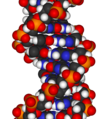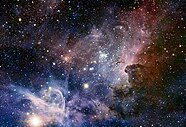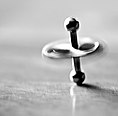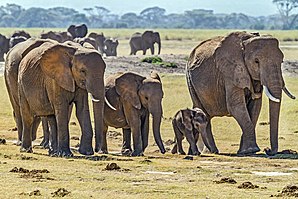
Back Natuurwetenskap Afrikaans Naturwissenschaft ALS Ciencias naturals AN علوم طبيعية Arabic Ciencies naturales AST Təbiət elmləri Azerbaijani طبیعت علملری AZB Тәбиғи фәндәр Bashkir Natuawissnschoft BAR Gomtuos muokslā BAT-SMG
| Part of a series on |
| Science |
|---|
 |
| General |
| Branches |
| In society |
Natural science is one of the branches of science concerned with the description, understanding and prediction of natural phenomena, based on empirical evidence from observation and experimentation.[1] Mechanisms such as peer review and reproducibility of findings are used to try to ensure the validity of scientific advances.
Natural science can be divided into two main branches: life science and physical science. Life science is alternatively known as biology, and physical science is subdivided into branches: physics, chemistry, earth science, and astronomy. These branches of natural science may be further divided into more specialized branches (also known as fields). As empirical sciences, natural sciences use tools from the formal sciences, such as mathematics and logic, converting information about nature into measurements that can be explained as clear statements of the "laws of nature".[2]
Modern natural science succeeded more classical approaches to natural philosophy. Galileo, Kepler, Descartes, Bacon, and Newton debated the benefits of using approaches which were more mathematical and more experimental in a methodical way. Still, philosophical perspectives, conjectures, and presuppositions, often overlooked, remain necessary in natural science.[3] Systematic data collection, including discovery science, succeeded natural history, which emerged in the 16th century by describing and classifying plants, animals, minerals, and so on.[4] Today, "natural history" suggests observational descriptions aimed at popular audiences.[5]
- ^ "Definitions of the Natural Science". uopeople.edu. 10 June 2021. Archived from the original on 27 December 2022. Retrieved 27 December 2022.
- ^ Lagemaat 2006, p. 283.
- ^ Gauch, Hugh G. (2003). Scientific Method in Practice. Cambridge University Press. pp. 71–73. ISBN 978-0-521-01708-4. Archived from the original on 2023-12-13. Retrieved 2015-07-02.
- ^ Oglivie 2008, pp. 1–2.
- ^ "Natural History". Princeton University WordNet. Archived from the original on March 3, 2012. Retrieved October 21, 2012.




